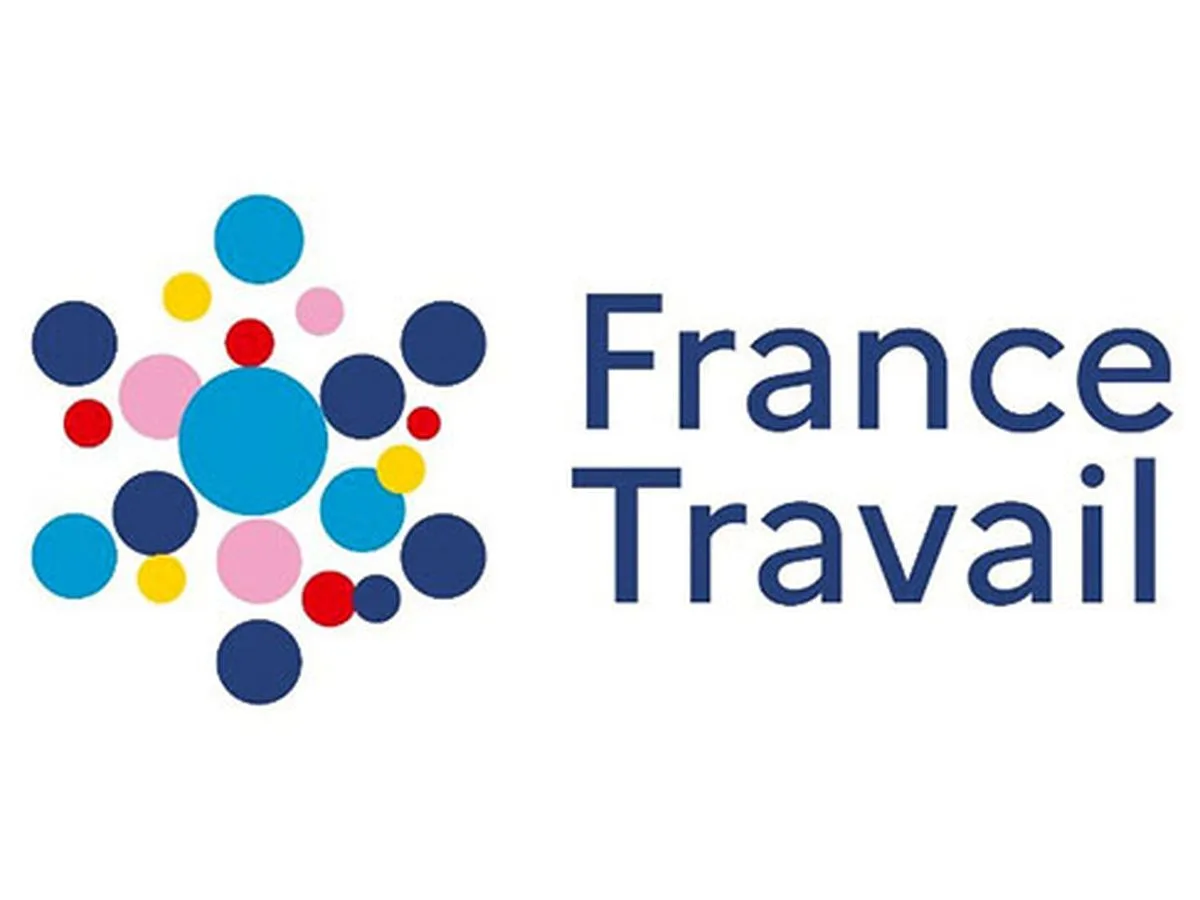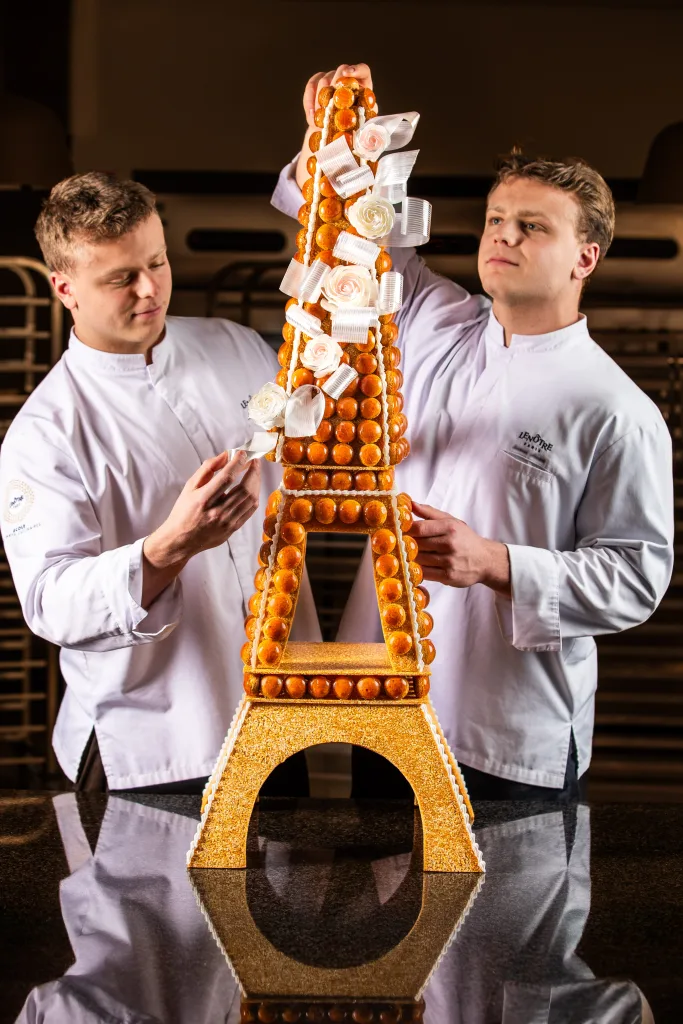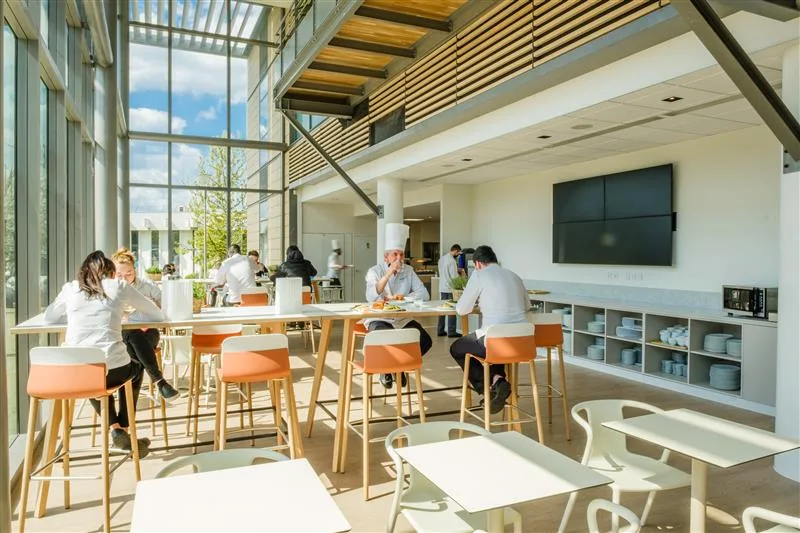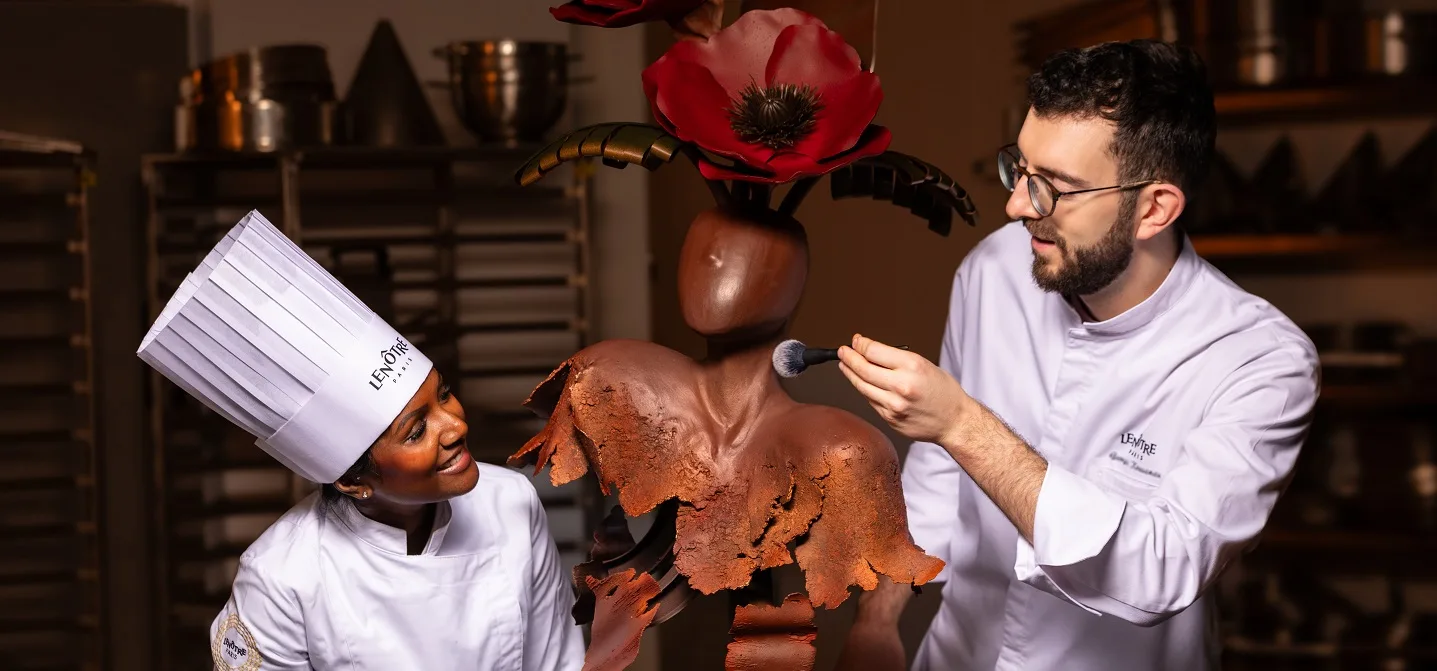The Pastry Program at Lenôtre School is designed for adults who wish to learn or transition into the field of pastry :
- Hobbyists and enthusiasts looking to switch careers
- Young professionals
- Professionals who left the trade for a while
A UNique teaching approach
The objective
The training objectives are to impart to the learners the gestures and rules that accompany the professional practice of this profession. Daily analysis of customer needs and expectations, as well as innovations in products and techniques used in the pastry confectionery sector, are among the validated skills. To achieve this, learners will be able to:
- Recipe development and professional pastry-making
- Preparing the pastry production
- Management of the professional pastry chef’s activity
Learners will be able to see all aspects of the profession; preparing, designing, producing, but also administratively managing and ensuring daily follow-up. All our training courses are entirely designed around practice and the repetition of gestures.
File submitted to France Compétences for a request for renewal of the RNCP certification
Our strengths
- 21 weeks of intensive training
- Maximum of 12 participants per course
- 97% success rate*
- 4 to 9 weeks of internships at Lenôtre establishments
- 2 weeks of training with award-winning chefs
*from March 2022 to September 2023, based on 39 participants.
Preparation and design of the pastry project:
- Revisit existing recipes and come up with new ones, keeping a constant watch on fashionable pastry trends to come up with the most creative ones
- Develop the list of recipes used, exploiting the range of savoury flavours to broaden the range and range of entremets
- Create signature patisseries, highlighting your own individuality and personal culinary sensibility to present a recognisable offering that stands out from the competition
- Develop recipes based on criteria of nutritional balance, taking into account the principles of dietetics and the impact of sweet foods on health (diabetes and obesity)
- Develop hypoallergenic recipes with regard to major allergens (egg, milk, wheat, etc.) and substitute products in order to provide a specific offer to the public concerned by these issues.
- Design pastry preparations that meet religious and ethical dietary requirements
- Draw up sheets for each pastry production, including ingredients, recipes and baking times, to ensure that the pastry is made in accordance with the instructions and achieves the desired result
Preparation of the pastry production :
- Prepare and organise the conditions for keeping the work area and equipment clean and operational in order to guarantee compliance with health and safety rules
- Draw up the pastry production plan with the scheduling of tasks to ensure that production is completed within the given timeframe
- Systematically check the quality, quantity and availability of ingredients to anticipate and manage unforeseen circumstances
- Determine the rate at which you work according to the work to be carried out, in liaison with the brigade and the head pastry chef, in order to optimise production
- Use appropriate techniques and tricks of the trade to make doughs, creams and biscuits
- Make viennoiseries, pastries and breaded products using fermentation methods
- Make confectionery and syrups (boulé, coulé, cassé, caramel, nougatine, etc.) using cooking temperatures and the physical and chemical properties of sugar
- Make ice creams and sorbets, taking into account the balances to be respected in order to create successful frozen desserts
- Personalise the recipes by using toppings and accompanying products (fresh, dried or poached fruit, chocolate, caramel, coulis, etc.) to multiply the flavours and enhance the result
- Create “artistic” decorations for the dishes by applying piping, icing and glazing techniques to enhance their presentation
- Arrange dishes on the plate and pastry pieces in the window, playing on colors, shapes, textures and volumes and using containers and accessories (socket pockets, cookie cutters, brushes, etc.) to highlight preparations
- Prevent risk factors likely to alter the final result (environment, cooling and temperature recovery techniques, operation of cold and hot connections, delay) to ensure successful recipes
- Develop recipes based on nutritional balance criteria based on the principles of dietetics and the health impact of sugary foods (diabetes and obesity)
- Develop hypoallergenic recipes with regard to major allergens (egg, milk, wheat, etc.) and substitute products to address a specific offer to the public concerned by these issues
Administrative management and monitoring of the activity of the professional pastry chef:
- Implement the HACCP method and principles to prevent potential hazards related to the handling of foods used in pastry preparations
- Ensure traceability and proper preservation of raw and processed materials using specific packaging, freezing and labelling processes for pastry products in order to comply with regulations
- Systematically measure the level of food safety to ensure compliance with hygiene regulations
- Manage, if necessary, a pastry brigade to organize a quality production
- Streamline purchases and retention of products according to their degree of processing to optimize costs
- Manage the stock of ingredients (order preparation, receipt and control of products) to ensure supply requirements taking into account storage capacities
- Manage relationships with suppliers of baked ingredients to guarantee supply and take advantage of promotional offers
- Calculate the costs of the various pastry productions in order to determine the selling prices and draw up estimates guaranteeing both an acceptable price and profitability
- Design a pastry recipe book by highlighting the “star” products and taking into account visual communication rules to ensure their promotion
- Manage its schedule and use the procedures and techniques for managing the activity in order to enable it to be monitored
- Maintain and track regulatory administrative documents to be able to meet health control procedures
How to finance your training?


Via the Skills Development Plan
•The Skills Development Plan identifies all of the training actions implemented by the employer for its employees.
•Do not hesitate to contact your human resources department
Via Individual Training Assistance (AIF)
•The AIF is an aid to the financing of your training that is intended for job seekers registered at Pôle emploi and people in accompaniment Professional Reclassification Contract (CRP) or Professional Transition Contract (CTP) or Professional Security Contract (CSP).
•Do not hesitate to consult your Pôle Emploi advisor, who will review the application in accordance with your Return to Work Project.
The prerequisites to be eligible for this training:
The access to the preparation of the pastry diploma is open by right to any (e) holder of a diploma or title of level attesting to a level 3 with a strong motivation for the trades of pastry, and catering.
Other possible levels after study of the file and professional project. This registration will be validated by an individual interview.
Eligibility:
- After an initial training course
- After a course of continuous training
- By Validation of Prior Learning (VPL)
Examples of opportunities and career prospects around pastry:
Pastry Chef
Pastry Cook
Pastry Sous Chef
Pastry Worker
Pastry Chef de Partie
Dough Specialist Pastry Chef (or Tourier Pastry Chef)
Catering Pastry Chef
Pastry Chef de Partie
Pastry Cook in a Kitchen
Assistant Pastry Chef
Pastry Business Manager
Pastry and Chocolate Maker
Pastry Confectioner
Entremetier (Dessert Specialist)
Restaurant Pastry Chef
Restaurant Pastry Commis
Typical Class Schedule:
- Monday to Thursday from 8am to 5:30pm
- Friday from 8am to 3pm
Every day, a welcome coffee is offered 1/2 hour before the start of the course.
The above times may vary depending on the course theme and calendar.
It is recommended to consult the schedule available at the beginning of the training.
Accessibility for People with Disabilities:
The training programs and internships offered by Lenôtre School are accessible to individuals with disabilities or health issues. We encourage you to mention it during your registration request. You will be contacted by the disability coordinator to discuss any necessary accommodations to ensure your stay with us goes smoothly. Upon your arrival, you will receive personalized support to facilitate your integration.
Our disability coordinator: Guillaume Galy – +33 1 86 93 04 00
Accommodation :
Lenôtre School can provide you with a list of useful addresses to find a rented room, studio, or apartment.
a journey that adapts to your needs
A 3-Act Pastry Training
Modular offer to follow 7 consecutive months of training or segmented. (See below).

L’essentiel
6 weeks to realize the basic recipes and techniques in pastry
L’Incontournable
7 weeks to make recipes or elaborate pastry techniques
La Maîtrise
8 weeks to develop an assortment of current and refined pastries
+
Practical Internship
4 to 9 weeks of on-the-job training to gain exposure to the professional world and apply acquired skills.
PROMOTION 2025
Registrations for the September 2025 intake are now open !

A COOKING SCHOOL NEAR PARIS
Accessible, modern, and welcoming premises
Since April 5, 2021, Lenôtre School is located in brand-new premises in Rungis (94), near Paris, just a stone’s throw away from one of the largest gourmet supplier markets. The school provides a pleasant living environment, easily accessible through various transportation options, and equipped with state-of-the-art equipment for optimal quality education.


